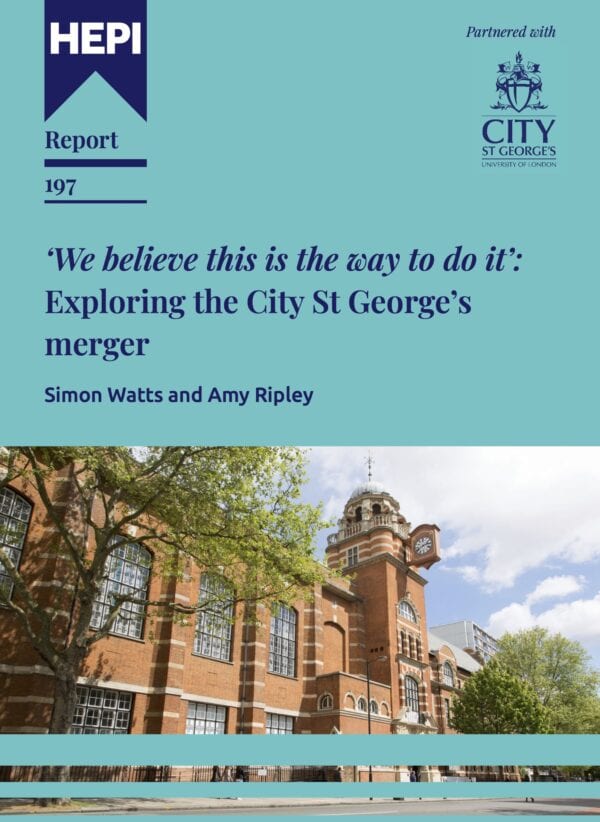Universities are boxed in: Is there a way out?
In a new HEPI Debate Paper, Universities are boxed in: Is there a way out?, Professors Diana Beech and André Spicer of City St George’s, University of London, argue UK higher education institutions are boxed in on six sides:
- by increasing regulation;
- by rising costs;
- by the falling income for each domestic student;
- by uncertain future demand from international students;
- by an increasing availability of alternative routes; and
- by a shrinking population.
The authors outline the many ways in which university leaders are responding and include 20 recommendations for managers, governors and policymakers aimed at building purposeful partnership. The final recommendation is to ‘Reunite research and higher education under a single ministerial portfolio in a business-focussed department’.
The report emerged from a meeting of minds. While Professor Beech had been talking to university boards about a basic ‘HE box’, it was not until she spoke to the Council of City St George’s just before joining the institution in a senior role that this box came to life via Professor Spicer’s thinking and change-management experience. The blend of HE policy and business insights from the two authors shines light on the many pressures facing universities and outlines various options to relieve the situation.
Professor Diana Beech, co-author of the report, said:
‘This report is a strategic wake-up call for university boards and executive teams everywhere. It offers not just a diagnosis of the multiple pressures boxing institutions in, but a practical framework for renewal – empowering leaders to make informed and courageous decisions that will shape the future of UK higher education.
‘As a governor, academic leader and former policymaker myself, I have watched the “HE box” develop apace from various perspectives. Yet while the box is real, it is not inevitable.
‘With bold leadership and a reimagined compact with government, the sector can move beyond survival and reclaim its role as a cornerstone of national prosperity and innovation.’
Professor André Spicer, the other co-author of the report, said:
‘Higher education leaders find themselves boxed in by regulation, changing student demand, increasing costs and many other factors.
‘The question leaders in the sector need to ask themselves is how are they going to deal with this box: are they going to learn to live within it, try to break out of the box, or seek to build new boxes to operate within? The answers they come up with are likely to shape the sector for decades to come.
‘Higher education appears to be facing a moment of profound transformation. Instead of thinking they are utterly unique, leaders in the sector should try to learn from moments of transformation in other sectors. This might help institutions identify how they can move forward in profoundly challenging circumstances.’
List of recommendations
University leaders
- Build collective understanding of strategic challenges
- Develop a coalition for action
- Embrace reductive innovation
- Take multilayered action (strategic, operational and financial)
- Search for longer term innovations, not just short-term efficiencies
- Take robust action to provide room for transformation and flexibility
- Learn lessons when change projects come to an end
University governors
- Determine clarity of mission
- Realign expectations
- Seek out skills in transformation
- Gather a diversity of views
- Determine risk appetite
- Understand the underlying activities
- Consider alternative models
Policymakers
- Enable flexible and mission-oriented regulation
- Incentivise strategic consolidation and collaboration
- Stabilise and rebalance core funding
- Support diversification of income streams with strategic investment
- Unlock talent, capacity and resource through skilled immigration reform
- Reunite research and higher education under a single ministerial portfolio in a business-focussed department
Notes for Editors
- Diana Beech joined City St George’s, University of London, in April 2025 as the inaugural Director of the new public policy hub, the Finsbury Institute. She is also Professor and Assistant Vice-President of Policy and Government Affairs. One was Diana’s previous roles was Director of Policy and Advocacy ay HEPI. She is Vice-Chair of the Board at the University of Worcester.
- André Spicer is the Executive Dean of Bayes Business School, City St George’s, University of London. He is also Professor of Organisational Behaviour and has worked with a range of large organisations including Barclays, IBM, Jaguar Land Rover, Allianz, Transport for London, the Civil Aviation Authority, the Bank of England and the Houses of Parliament.
- HEPI was established in 2002 to influence the higher education debate with evidence. We are UK-wide, independent and non-partisan. We are funded by organisations and higher education institutions that wish to support vibrant policy discussions, as well as through our own events. HEPI is a company limited by guarantee and a registered charity.







Comments
John says:
Cliche begat cliche!
Reply
Clive Pianon says:
Worst advice in a report I can imagine. So lacking in vision. Why not suggest privatising the universities and selling off their assets to the highest buyer. Seriously, does anyone take this kind of uncritical advice seriously? Well, except for vice-chancellors, a breed rather short of common sense but heavily overpaid.
Reply
Add comment